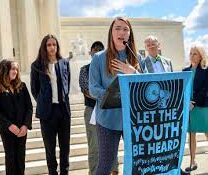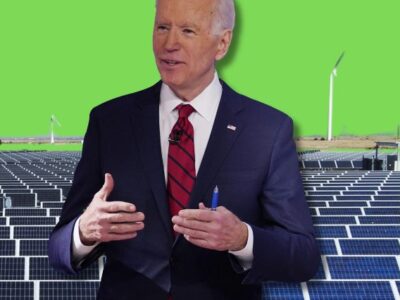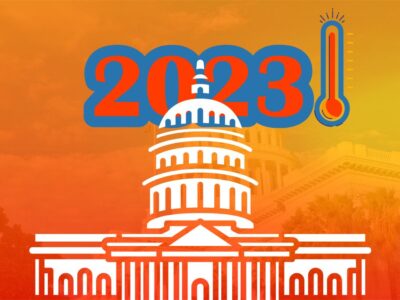The Children’s Crusade
The latest climate lawsuit is well intended, but it's almost certain to lose and could do serious harm.
The Children’s Trust has filed another lawsuit, one that gives me serious qualms. I know their hearts are in the right place, but I wish they had thought twice about filing this case. I struggle to find any benefit from the litigation. It has no apparent chance of success. Worse, it disparages people in the federal government who have devoted their lives to fighting climate change. And it may also feed into the dangerous message that there is no real difference be...
CONTINUE READINGHow Will Americans Learn to Love the Inflation Reduction Act?
Pres. Biden has toured the country to sell his climate victories, but polls show it isn’t resonating yet with voters. Will Trump attacks help?
Last February, on the eve of the State of the Union, President Joe Biden embarked on a victory lap for his landmark climate laws. At the time, the White House was focused on explaining to the American people how the Bipartisan Infrastructure Law and the Inflation Reduction Act would boost jobs and lift the economy. Biden did so without uttering the word “climate.” I wrote then about this decision to stay quiet on the climate impacts of his legislation, asking “...
CONTINUE READINGReviewing Agency Indecision
The Third Circuit straightens out a quirk in FERC law, to the benefit of renewable energy.
A case decided by the Third Circuit last week is important for two reasons. It clarifies an important procedural issue applying to the Federal Energy Regulatory Commission (FERC). And it upholds an important policy shift regarding renewable energy by the country’s largest grid operator. Since you’re probably more interested in the second point than the first one —unless you’re a real administrative law geek— let’s start with that one. The grid operator i...
CONTINUE READINGFood and Farming Makes the Menu at UN Climate Talks
Guest contributor Antonia Moure Richard of UCLA Law reports that regenerative agriculture was a big focus of COP28, but industrial farming was largely ignored.
At the United Nations climate conference known as COP28, it was easy to come to the realization that we must confront every aspect of the climate crisis, and we must do it right now. That includes transforming our food systems. Agriculture has historically been left out of the conversation at COP. That changed this year with the Declaration on Sustainable Agriculture, Resilient Food Systems, and Climate Action, which was signed by 134 world leaders. This agreement...
CONTINUE READINGThe Year in California Climate Laws
Looking back at California’s 2023 legislative session, our new environmental laws represent a solid step forward—bigger than expected.
If 2022 was a Rivian with all the bells and whistles, this past year was more a Ford Lightning. After a landmark 2022—a record $54 billion committed to climate spending and legislation that codified the state’s goals of carbon neutrality by 2045 and 90 percent clean electricity by 2035—a significantly gloomier budget forecast gave rise to fears that California’s climate programs would take a hit. While 2023 was by no means the blockbuster year 2022 was, in ma...
CONTINUE READINGHow much should we worry about climate tipping points?
A new report suggests climate tipping events may be inevitable, and urges transformative approaches to climate policy
It’s hard to keep up with the deluge of climate news around COP28. Climate damages are growing. Carbon budgets are running out. Temperature records are being re-written. Despite new pledges, climate action remains hugely insufficient and grossly unfair. And the world may be unable to avoid passing critical climate tipping points.That last comes from a new review of the state of Global Tipping Points, produced by more than 200 scholars, coordinated from the University...
CONTINUE READINGThe Mystery of the Missing Stay Order
Why is the Supreme Court waiting for weeks to dispose of a demand for extraordinary intervention in a routine situation?
The steel industry applied for Supreme Court intervention on what they claimed was an urgent issue of vast national importance. Chief Justice Roberts requested an immediate government response. That was six weeks ago. Since then . . . crickets. No doubt you’re on the edge of your seat, wondering about the impending crisis facing the industry and the earthshaking legal issue in the case. And maybe also wondering why this is the first you’ve heard about it. H...
CONTINUE READINGThe COP28 Halftime Report
Has the annual UN climate conference grown too big to function? Takeaways from Week 1 of COP28 in Dubai.
We’ve reached the midpoint of the annual, two-week international climate conference known as COP (for “conference of parties”), so it’s a good time to reflect on what’s gone down in Dubai. I’m attending along with a delegation of UCLA Law students and colleagues here to follow a range of issues, from methane regulation to China’s global role to regenerative agricultural practices. Having been to more than a handful of these conferences going back t...
CONTINUE READINGPearl Harbor Today
82 years after the attack, what is the state of the harbor?
Today is Pearl Harbor Day, the anniversary of the Japanese attack that launched the U.S. into World War II. Those of us who don’t live in Hawaii may not think much about the harbor, but I started to wonder how things were going environmentally there. The geography is more complex than I had expected. I think of a harbor as just an area where boats can park, maybe in a protected bay. (You can see I'm not very nautical, I guess.) There are actually three large water...
CONTINUE READINGA $1 Billion Investment in the ‘New Forest Economy’
A global group of governors just issued a call-to-action for more flexible funding for forest protection. Here’s why that’s important.
On December 5, as the 28th Conference of the Parties (COP28) to the United Nations Framework Convention on Climate Change continues full swing in Dubai, Governors, Indigenous Peoples, and other partners of the Governors’ Climate and Forests Task Force (GCF Task Force), launched an urgent call-to-action to finance what they are calling the “New Forest Economy.” This call-to-action seeks to garner an initial $1 billion in investments and support to transform the stat...
CONTINUE READING













